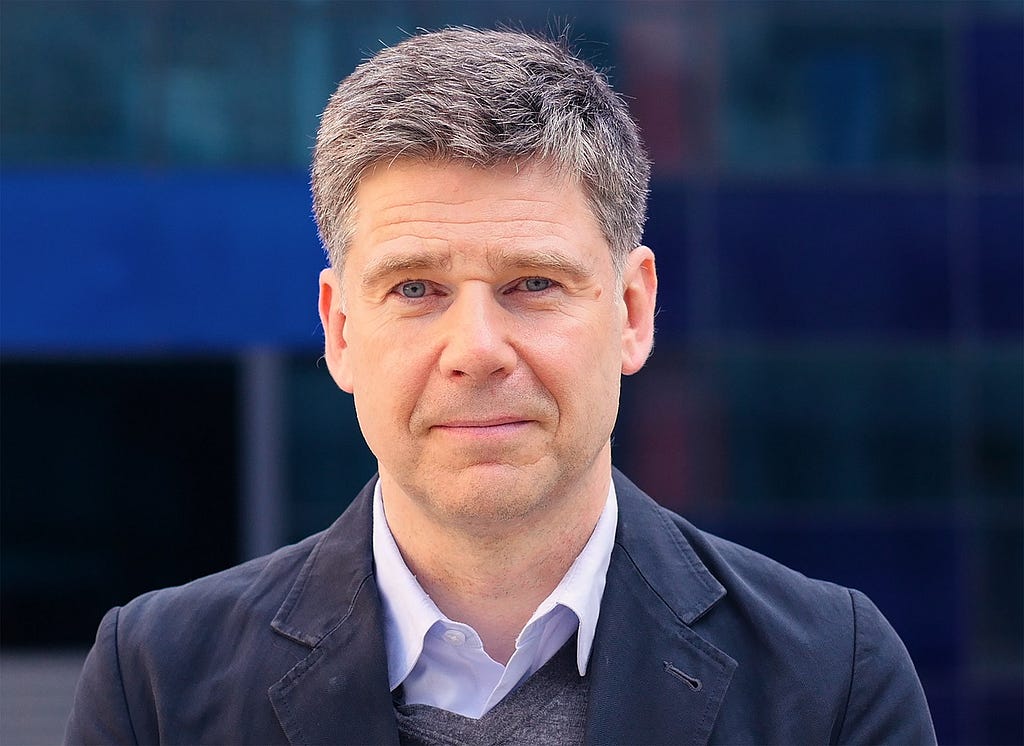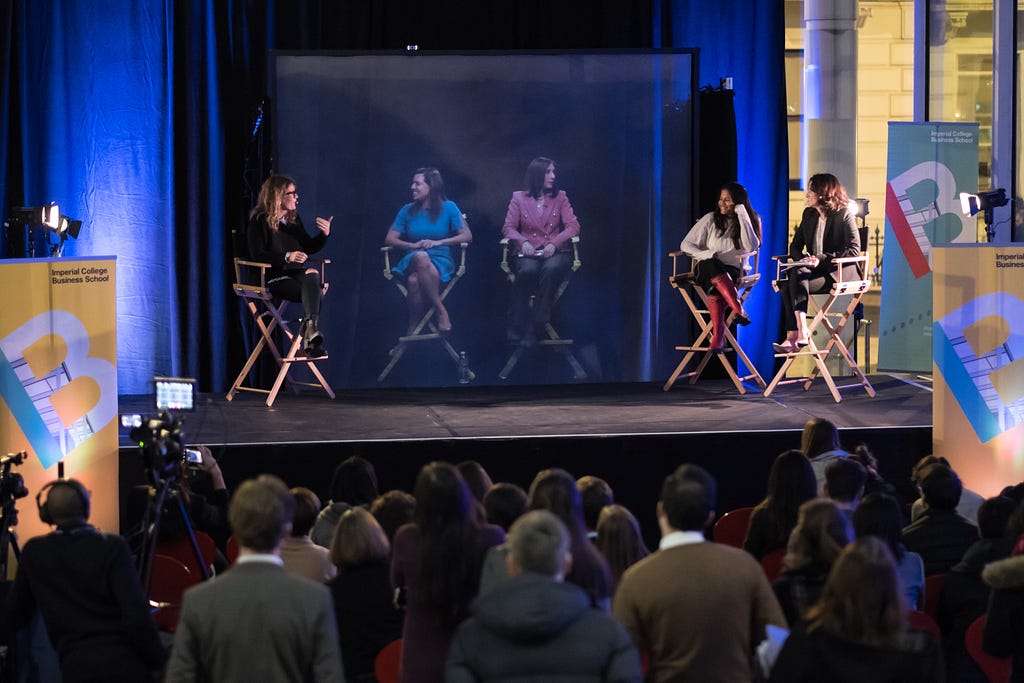The Future Is Now: “Holograms will give our students greater exposure to the wider world” With David Lefevre and Fotis Georgiadis

A handful of extra-ordinary tech entrepreneurs really did change the world, I am thinking primarily of Steve Jobs and Bill Gates. But all most of us can aim for is small but valuable improvements to the status quo. In this case, we hope that the holograms will give our students greater exposure to the wider world. Guest speakers from far afield will no longer need to jump on a plane to talk to our students in a realistic manner.
I had the pleasure of interviewing David Lefevre, Director of the EdTech Lab at Imperial College Business School in London.
Thank you so much for doing this with us! Can you tell us a story about what brought you to this specific career path?
I started my career in the music industry and found myself on the wrong side of the digital disruption that swept the sector, so I returned to education taking a master’s degree in computing and a PhD in education. By luck, I now find myself on the right side of the digitization that is impacting higher education.
Technology enables universities to improve the quality of their courses, to reach out to new audiences away from the physical campus and, in certain scenarios, to reduce costs. These are powerful drivers for change and the use of technology is sweeping slowly but steadily across the sector. My area of interest is to help universities make this transition.
Can you share the most interesting story that happened to you since you began your career?
My favourite story relates to a postgraduate student who was struggling with our online maths course. He was a super smart student but had a blind spot for mathematics. He failed he examination three times which is the only time this has happened. However, because the course was online, he was able to take the modules repeatedly during his time with us and, with the help of some additional 1–1 tutorials towards the end, eventually passed the examination. The interesting part to the story is that I later received a letter from his father stating that this was the first time he his son had passed a mathematics exam since high school and that he was absolutely over the moon. This was a very clear example of how technology can enhance education.
Can you tell us about the “Bleeding edge” technological breakthroughs that you are working on? How do you think that will help people?
We have just partnered with a Canadian firm called AHRT Media to deliver lectures to our students via hologram which is very exciting. The tech has been adapted by Imperial’s Edtech Lab, to enable faculty and guest speakers to present to students in real time from studios located in a variety of global locations.
Rather than simply projecting a pre-recorded message, the technology enables those appearing via hologram to engage with their audiences in real-time, responding to audience reactions and taking questions via a camera link in the same manner as if they were physically present in the lecture theatre.
It will also make it possible for Imperial College Business School to host lectures in multiple classes and locations simultaneously, as well as discussion panels and round-table events with a mixture of both in-person and virtual speakers present.
Introducing hologram technology to the classroom will break down the limitations of traditional teaching by creating an interactive experience that benefits both students and academics.
How do you think this might change the world?
A handful of extra-ordinary tech entrepreneurs really did change the world, I am thinking primarily of Steve Jobs and Bill Gates. But all most of us can aim for is small but valuable improvements to the status quo. In this case, we hope that the holograms will give our students greater exposure to the wider world. Guest speakers from far afield will no longer need to jump on a plane to talk to our students in a realistic manner.

Keeping “Black Mirror” in mind can you see any potential drawbacks about this technology that people should think more deeply about?
I think hologram technologies will be relatively benign in comparison to technologies such as big data and AI, which will certainly regularly appear in Black Mirror episodes.
Was there a “tipping point” that led you to this breakthrough? Can you tell us that story?
We had wanted to experiment with holograms for a long time however the cost of hologram broadcasts were prohibitive for universities until ARHT Media produced a technology which reduced the cost significantly.
What do you need to lead this technology to widespread adoption?
The key to its success will be greater adoption. There is a definite network effect along the lines of any communications technology. The more people there are that have the technology, the useful it will be.
What have you been doing to publicize this idea? Have you been using any innovative marketing strategies?
We didn’t need to work too hard on this one. Holograms still bring up images of Star Trek for most of us and the technology has attracted a great deal of attention, due to its sci-fi appeal.
Beyond that, we have used media interest to prove that hologram technology is not just a gimmick — particularly not in the way that we’re using it — and adds real value to students’ learning experience. For example, to launch the technology we hosted an event for students which focused on women who had built successful careers in the tech sector, and invited female tech professionals such as Marily Nika, Google’s Woman of the Year 2018 and Imperial alumna to share advice with our students via hologram.
None of us are able to achieve success without some help along the way. Is there a particular person who you are grateful towards who helped get you to where you are? Can you share a story about that?
There are many. I had a fabulous mentor at Imperial College: Professor Dot Griffiths, who protected me from the politics that engulf any large organization and gave me the freedom to play and experiment.
How have you used your success to bring goodness to the world?
I am very lucky to work in an industry which I believe is a force for good and in which the benefits to people are apparent. At Imperial College Business School, we see the impact our programmes have on our students and the opportunities that they discover.
What are your “5 Things I Wish Someone Told Me Before I Started” and why. (Please share a story or example for each.)
- ‘Stick at it’ — Despite the inequalities that exist, I do believe that if someone has a plan and pursues it with grit and common sense then they will reach a point at which they are happy with their lot.
- ‘Find mentors’ — Seek out people who are successfully doing the thing you want to do or people that have influence in your sector. Their advice will be invaluable.
- “Get a good education and at the best school you can’ — Most vocations have a body of knowledge that you will either need or find useful. Learning may be lifelong but an intensive period of study in a good university will accelerate matters.
- “Be bold’ — I learned this from a business partner who always pursued very grandiose visions. I am now a firm believer in the adage “shoot for the moon and if you miss you will still be among the stars”.
- ‘Take control’ — This is more a mentality than an action. If you firmly believe that you are in control of your own future then, miraculously, you often are.
You are a person of great influence. If you could inspire a movement that would bring the most amount of good to the most amount of people, what would that be? You never know what your idea can trigger.
I am not a person of great influence but am very interested in the idea of ethical businesses. Business plays a critical role in society and is a positive force for good when conducted ethically. However, less scrupulous individuals can harness business for personal greed and also treat people in manner which is unfair. At present there is little comeuppance for such behaviour and I believe that a movement which created a societal taboo around unethical business practice would greatly benefit us all.
Can you please give us your favorite “Life Lesson Quote”? Can you share how that was relevant to you in your life?
“The best way to predict your future is to create it.” — Abraham Lincoln. Of course, very few of us will become the president of the United States, but I think this advice is of use to us all. I always found it highly stressful and disempowering to rely on others to make key decisions affecting our futures. A less stressful and probably more successful mind-set is to take control and responsibility for yourself.
Some very well-known VCs read this column. If you had 60 seconds to make a pitch to a VC, what would you say? He or she might just see this if we tag them
I am not looking for VC money right now but my advice would be to treat entrepreneurs kindly!
How can our readers follow you on social media?
https://www.linkedin.com/in/david-lefevre-b524522/
https://twitter.com/edtech_lab?lang=en
Thank you so much for joining us. This was very inspirational.
The Future Is Now: “Holograms will give our students greater exposure to the wider world” With… was originally published in Authority Magazine on Medium, where people are continuing the conversation by highlighting and responding to this story.



